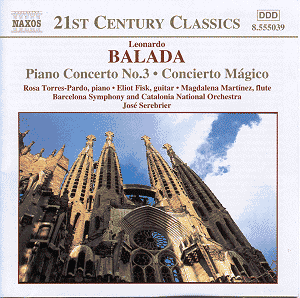 |
Leonardo BALADA (b.1933) Concerto for piano and orchestra No 3 (1999) Concerto Magico for Guitar and orchestra (1997) Music for Flute and Orchestra (2000) Rosa Torres-Pardo Piano Eliot Fisk, guitar Magdalena Martinez, Flute Recorded Sala Simfonica Barcelona July 2000 Crotchet AmazonUK AmazonUS Amazon recommendations |
This disc comes in Naxos' 21st Century Classics series. My first reaction is why should this little known composer feature in this series. Does Naxos expect him to become a Classic of this century, or are these works after only 18 months of the century already classics?
This is the second disc that Naxos has produced of the music of Leonardo Balada. He is not a household name in Britain, sad to say, but he soon may well be, for this is colourful, exotic and evocative music.
Balada is from Catalonia, the Spanish side and his inspiration is Spanish. In fact the CD cover of an unusual view of the still unfinished Sagrada Familia is very appropriate in many ways. Balada was born and bred in Barcelona and his music is played here by friends and compatriots who know him and understand his music and have played other of his works. Indeed the composer mentions a number of large-scale works in his excellent booklet notes.
To quote the outside of the CD box, "Balada has pioneered the blending of ethnic music with avant-garde". You might feel that is nothing new but the composer himself elucidates a little further in the booklet notes as follows: "Classical composition…. falls into one of two categories: music that contains folk elements and music that odes not …" Later he adds "The feeling was that the use of folk elements in serious music was facile, a cheap trick that served as a distraction from the abstractions then in favour."
His earlier music had " reflected the strict philosophy of the time". After ten years he decided " to superimpose folk elements on abstractions". This is the composer's ideological motivation. So we must decide 'does it work'? And I, must say an unreserved YES, but with the proviso that you must have open ears. Let me signpost you briefly into some points of each of the three concertos.
The 3rd Piano Concerto, which was written for the present performer Rosa Torres-Pardo, begins in a wild and fiesta-like fashion with some remarkable virtuoso writing for the orchestra and the soloist. Movement 2 begins with bongos, glissandi strings and quarter-tones in the wind, almost oriental sounding, but evoking the sounds of 'Andulsi' and of Morocco just across the water, as it were. Movement 3 is a 'jota' - a dance from Aragon. Castanets and drums play in unison just as can still be heard on the streets on Northern Spanish towns with woodwind melismas that could be straight from Canteloube.
The Guitar Concerto is the composer's third and was written for Angel Romero. The first movement evokes Andalusian Gypsies and starts after a brief ad libitum crescendo with a flamenco-sounding guitar accompanied by foot-tapping sounds on various percussion instruments. Movement 2 'Luna' is a long movement with yearning woodwind solos over distant church bells again with quarter-tones and glissandi and high harmonics. Movement 3 'Duende' uses the rhythm of the 'Zapatendo' which is really a 'pertuum mobile'
'Music for Flute and Orchestra' has not yet been performed. It uses two Catalan melodies but opens in the usual arresting manner with a high orchestral screech which the surrounds the flute in a halo as it dips and rises into flutter tonguings, quarter-tones and glissandi of its own.
To throw some further light on Balada's style I turned to the music of another underestimated Catalonian Composer, the doyen of Catalan music, Xavier Montsalvatge (born 1912). He is also an extraordinary eclectic composer, one who can produce very colourful and highly original sounds as if from no particular school or background. If you have ever heard his 'Laberinto' or 'Sortilegis' (ASV 1060) then I would describe Balada as a step or two further down the modernistic road but still very approachable. Perhaps if Falla had lived to be over 120 and still developing he might have written this guitar concerto.
These performances seem absolutely ideal and the recording balance wonderful and immediate. All three soloists are quite superb and are meticulous in the joy they bring to the performances.
I often read or hear people commenting patronisingly about Naxos, that their CDs are tremendous value, when what they mean is "well they are so cheap it doesn't matter if you only play the disc once". I would buy this disc even if it were top price. These are outstanding performances of terrifically interesting and fascinating music. At any price I would go out and snap it immediately.
Gary Higginson